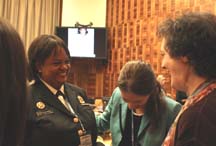World Health Assembly
World Health Assembly adopts two landmark Resolutions on the promotion of junk foods and baby foods
 Twenty nine years after the adoption of the landmark International Code of Marketing of Breastmilk Substitutes, the World Health Assembly adopted two new historic Resolutions which may have a long-lasting impact on child health.
Twenty nine years after the adoption of the landmark International Code of Marketing of Breastmilk Substitutes, the World Health Assembly adopted two new historic Resolutions which may have a long-lasting impact on child health.
First, a Resolution (WHA 63.14) proposed by Norway, calls for Member States to implement a set of Recommendations (which we had input into) on the Marketing of foods and Non-alcoholic Beverages to Children - referred to by many as the ‘Junk Food Code’. These call on governments to take a lead in policy setting and to restrict marketing, including in ‘settings where children gather’ (e.g. schools) and to ‘avoid conflicts of interest.’
A new Resolution on Infant and Young Child Nutrition (WHA 63.23) highlighted the damaging impact of the commercial promotion of baby foods on the health and survival of children and on childhood obesity. The Resolution, initially proposed by Peru, aims to raise the profile of nutrition in public health policy setting - a double-edged sword which can create opportunities for market-led solutions to development (see page 12) so we were on guard. After three days of discussion with many developing countries highlighting industry’s continued irresponsible promotion, the Resolution was adopted with several key amendments.

(Left: Briefing the US Surgeon General, Vice- Admiral Regina Benjamin, at the World Health Assembly).
Infant and Young Child Nutrition Resolution (WHA 63.23) key points:
- The Resolution expresses “further concern over reports of the ineffectiveness of measures, particularly voluntary measures, to ensure compliance with the International Code of Marketing of Breast-milk Substitutes in some countries.”
- recognizes “that the improvement of exclusive breastfeeding practices, adequate and timely complementary feeding, along with continued breastfeeding for up to two years or beyond, could save annually the lives of 1.5 million children under five years of age.”
- Member States are called on to protect, promote and support breastfeeding during emergencies, to plan ahead using the Operational Guidance on Infant and Young Child Feeding in Emergencies for Emergency Relief Staff and to ensure that any required breastmilk substitutes are purchased, distributed and used according to strict criteria.
- to “end to all forms of inappropriate promotion of foods for infants and young children and to ensure that nutrition and health claims shall not be permitted except where specifically provided for foods for infants and young children except where specifically provided for, in relevant Codex Alimentarius standards or national legislation”.
- to “develop and/or strengthen legislative, regulatory and/or other effective measures to control the marketing of breastmilk substitutes in order to give effect to the International Code [and relevant WHA Resolutions]”
- “Calls upon infant food manufacturers and distributors to comply fully with their responsibilities under the International Code [and subsequent relevant WHA resolutions]
The importance of breastfeeding in reducing child mortality was highlighted in Resolutions on the Prevention of Pneumonia (WHA 63.24, 1.5.c) proposed by the UK and the Millennium Development Goals (WHA 63.15, 1.6).
Warning: Nestlé is lobbying policy makers in Africa to be included as partners in health policy setting. WHA Resolutions 49.15, 58.32, 61.20. call for Conflicts of Interest to be avoided.






